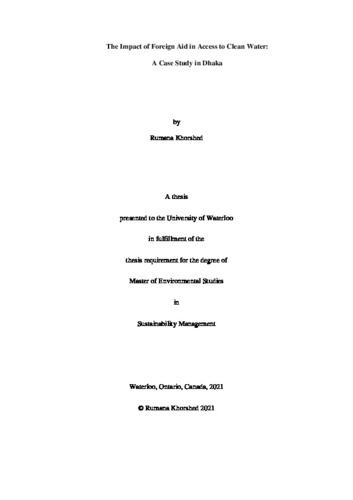| dc.contributor.author | Khorshed, Rumana | |
| dc.date.accessioned | 2021-09-24 17:35:34 (GMT) | |
| dc.date.available | 2021-09-24 17:35:34 (GMT) | |
| dc.date.issued | 2021-09-24 | |
| dc.date.submitted | 2021-09-21 | |
| dc.identifier.uri | http://hdl.handle.net/10012/17522 | |
| dc.description.abstract | Dhaka, the most densely populated megacity in Bangladesh, has been a major contributor to the country’s economic growth. To keep the city livable and its economy in motion, access to clean, drinkable, and adequate water is necessary. The ongoing COVID-19 pandemic demonstrates the importance of proper access to safe water to prevent infection. However, despite a significant increase in the flow of aid to Dhaka’s water supply over the last few years, the city has failed to maintain an adequate supply of fresh, clean water to its burgeoning population, especially to the sprawling slum areas occupied by destitute and low-earning people, which harms economic potential and hinders the achievement of SDG targets.
Moreover, to ensure access to clean water for all and achieve SDG by 2030 requires huge investment in Dhaka’s water sector. However, most of the funding for Dhaka's water sector is met by foreign aid.
Through a simple linear regression model, this study investigates the impact of foreign aid on the water supply in developing countries and found foreign aid on the water supply has a statistically highly significant and positive impact on health outcomes in developing countries. Moreover, similar regression reveals that foreign aid on the water supply can significantly improves social and economic development in Bangladesh. Furthermore, this study attempts to uncover whether access to water and the SDG implementation of Dhaka can be achieved without relying on foreign aid.Though qualititative approach, this paper explored all the exisiting domestice sources of funding in Dhaka’s water and finds that foreign aid is still a critical source of finance for Dhaka’s water supply to fill the budget gap.
The study also analyzes Bangladesh's National Strategy 8th Five Year Plan and Delta Plan 2100, reviewing the impact of foreign aid in financing on Dhaka's water supply as well as the strategies adopted to address and mitigate current challenges. Finally, the study proposes a set of recommendations to increase the investment and efficiency of foreign aid in Dhaka's water supply, ensuring resident's access to water and contributing to the SDG achievement. | en |
| dc.language.iso | en | en |
| dc.publisher | University of Waterloo | en |
| dc.subject | Foreign Aid, Dhaka WASA, Water Supply in Dhaka, Sustainable Development Goal (SDG) | en |
| dc.title | The Impact of Foreign Aid in Access to Clean Water : A Case Study in Dhaka | en |
| dc.type | Master Thesis | en |
| dc.pending | false | |
| uws-etd.degree.department | School of Environment, Enterprise and Development | en |
| uws-etd.degree.discipline | Sustainability Management | en |
| uws-etd.degree.grantor | University of Waterloo | en |
| uws-etd.degree | Master of Environmental Studies | en |
| uws-etd.embargo.terms | 0 | en |
| uws.contributor.advisor | Segger, Marie-Claire | |
| uws.contributor.affiliation1 | Faculty of Environment | en |
| uws.published.city | Waterloo | en |
| uws.published.country | Canada | en |
| uws.published.province | Ontario | en |
| uws.typeOfResource | Text | en |
| uws.peerReviewStatus | Unreviewed | en |
| uws.scholarLevel | Graduate | en |

